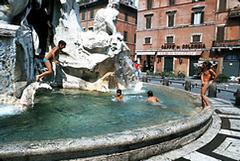The 2005 Essay Prize Competition
An essay contest in Two stages open to all current full-time registered students in an undergraduate architecture degree program, undergraduates majoring in architecture, or diploma students in accredited schools of architecture worldwide. 5,000USD Purse.
BackgroundThe Berkeley Prize Undergraduate Essay Competition was established in the Department of Architecture at the University of California, Berkeley to promote architecture as a social art through writing and criticism, two traditionally underrepresented aspects of the architecture curriculum. Architectural history, theory and practice are rich with concepts and realizations of building that signify architecture as a social art. In addressing the question posed by the Berkeley Prize 2005 essay competition, you will consider this legacy and its relevance to you as future architects. Second Annual Berkeley Prize Travel Fellowship CompetitionThe 2004 Competition established the Berkeley Prize Travel Fellowship. This new Prize recognizes the vital role that exposure to other cultures and environments plays in helping to demonstrate the reality and importance of the social art of architecture. All Finalists for the Essay Competition are invited to submit proposals demonstrating how they would use a two-week trip to an architecturally-significant destination selected by the Prize Committee. The winner of the Travel Fellowship Competition will receive airfare and a stipend to pursue his or her proposal in the Summer/Fall 2005. Dedication
This year's Berkeley Prize is dedicated to the work of Forum UNESCO - University and Heritage (FUUH), striving to connect the resources of universities, teachers and students worldwide in the preservation of our cultural heritage. Forum UNESCO - University and Heritage (FUUH) was created in 1995 by UNESCO. Its objectives are:
FUUH It is considered as an official activity or program of UNESCO, inscribed in its program and budget. At its inception, FUUH dealt with traditional "heritage" disciplines such as the history of art, urban planning, archaeology, etc. Then, through the crossing of disciplines, it widened its reach tremendously. For example, internet technology disciplines can be crossed with archaeology; political sciences can explore the political decision-making processes in historic centers' management; chemistry and physics can explore the dynamics of building materials. The disciplinary potential of this network is virtually infinite. FUUH now counts over 400 universities worldwide that have participated in the network activities. FUUH is co-managed by UNESCO and a university or universities. To date, the Polytechnic University of Valencia (UPV), Spain has assumed this responsibility. Last year, it was decided that other universities could play a regional role to develop the network within their scope of influence. The first of these new partners is Deakin University, Melbourne, Australia, which now is developing the network in South East Asia and the Pacific. FUUH is actively soliciting universities worldwide to accept this role in their part of the globe. On UNESCO's side, the network was under the responsibility of the Cultural Heritage Division from 1995 until 2002. Since 2002 it has been placed under the responsibility of the World Heritage Center of UNESCO. (See Berkeley Prize archives, and the UNESCO World Heritage) Each time a university wishes to become more involved in FUUH activities, by organizing a workshop, a summer university, students' work camp, a seminar, or by publishing some academic research, it can do so by having its project adopted by universities gathered during a yearly international seminar. The most recent of these was held in Argentina at the University of Buenos Aires in October 2004. In 2005, the international seminar will be held at the University of Newcastle, UK, from April 11-16. The over-riding idea is that UNESCO cannot fulfill its mission regarding heritage without support from key stakeholders in the civil society, including schools, teachers, and students. It is a win-win concept:
For more information, contact: Marielle RICHON (Ms) Program Specialist Focal Point for Universities Promotion, Publications and Education Unit World Heritage Center UNESCO 7, place de Fontenoy 75352 PARIS 07 SP France e-mail: m.richon@unesco.org website: http://whc.unesco.org/ Additional Help and InformationAre you in need of assistance? Please email info@berkeleyprize.org. |
|


